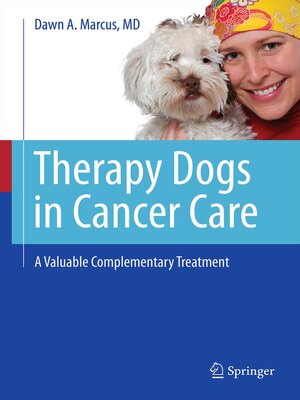
Sign up to save your library
With an OverDrive account, you can save your favorite libraries for at-a-glance information about availability. Find out more about OverDrive accounts.
Find this title in Libby, the library reading app by OverDrive.



Search for a digital library with this title
Title found at these libraries:
| Loading... |
Dogs that visit patients with cancer have been convincingly shown to reduce stress, loneliness, and mood disturbance that may complicate cancer care. In addition, dogs may provide important motivation for patients to maintain rehabilitation programs that have been shown to reduce cancer risk and improve cancer survival. Outlining all of these issues and many more, Therapy Dogs in Cancer Care: A Valuable Complementary Treatment is a ground-breaking, highly innovative addition to the literature on cancer care. Detailing a comprehensive summary of truly impressive research demonstrating the ability of dogs to serve an important therapeutic role within the cancer arena and in other serious medical conditions, the text provides highly practical advice and very helpful "tips" to ensure that those who wish to employ dogs to assist the cancer patient have the necessary knowledge and "tools" to optimize outcomes. Authored by Dawn A. Marcus, MD, an expert in both pain management and health improvement through human and dog interaction, Therapy Dogs in Cancer Care: A Valuable Complementary Treatment is an extremely well-organized, well-researched, and highly readable book. Providing practical suggestions to effectively incorporate dogs into cancer care, with detailed instructions about requirements for therapy dogs to ensure visits are safe and limit unwanted spread of infection, Therapy Dogs in Cancer Care: A Valuable Complementary Treatment is an invaluable reference that will inform and delight both the clinician desiring a "how-to" text as well as the casual reader.






